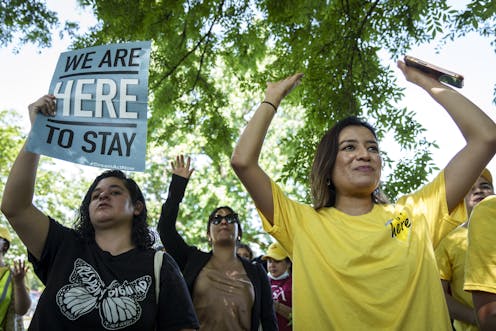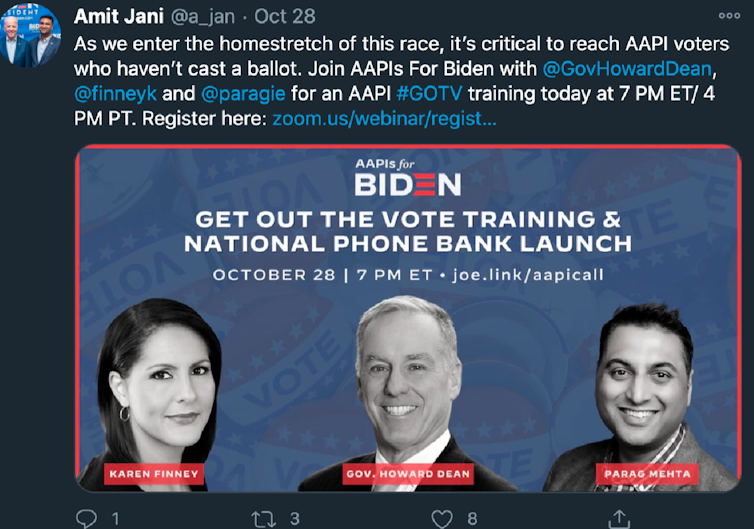Young immigrants are looking to social media to engage in politics and elections – even if they are
The number of immigrant voters is on the rise – and research shows that for young immigrants, social media is where they are primarily wading into politics.

Immigrants’ political power is on the rise in the United States.
The number of eligible immigrant voters nearly doubled from about 12 million in 2000 to more than 23 million in 2020.
Immigrant voters tend to be older than U.S.-born voters, but immigrants ages 18 to 37 still made up 20% of all immigrant voters in 2020.
We are a team of scholars and students across disciplines and universities researching immigrant youths’ civic development – and we think it’s important to recognize that young immigrants are also playing a key role in galvanizing older immigrants to vote, primarily by connecting with them via social media.
Our research shows that online sites and apps like Twitter are key for young immigrants – both people who were born outside of the U.S. and those who are second-generation immigrants – as ways to engage in politics. Many young immigrants use social media to follow news in their local communities, as well as in their countries of origin. They also use it to organize protests and encourage others to vote.
This is true even when these young people are not eligible to vote because of their immigration status.

A key issue
Immigration is a core issue for many voters in the upcoming midterm elections. An August 2022 Pew Research poll found that nearly 50% of registered voters reported immigration was “very important” to them in the November 2022 election.
Some Republican politicians, such as Florida Gov. Ron DeSantis and others who are also up for re-election, have focused on immigration in their campaigns by pointing to record numbers of migrants crossing the U.S. border. Republican politicians have also relocated thousands of migrants to liberal places like Washington, D.C., New York and Massachusetts over the past several months.
President Joe Biden’s plan to revamp the country’s immigration system and provide a path for about 11 million undocumented residents to gain citizenship, meanwhile, remains stalled in Congress.
Over the past several years, though, young immigrants – people ages 18 to 23 who were born in other countries, or whose parents were – have helped lead national movements to provide a conditional path to citizenship for young undocumented immigrants, resulting in the 2021 passage of the DREAM Act. This policy gives millions of undocumented immigrants who came to the U.S. as children the right to stay in the country.
The DREAMer movement relied heavily on social media to spread information and encourage people to take action. Based on immigrant youths’ prior successes mobilizing their communities for political change, we believe that their online political engagement could have implications for the 2022 midterms.
Mobilizing others
Our research study in 2020 explored how immigrant youth ages 18 to 23 used social media to participate in politics. We took 2,300 screenshots of political tweets from January through November 2020, drawing from a sample of 32 young immigrants’ public Twitter feeds that we found through national immigrant youth networks, like United We Dream.
Based on the content of their Twitter profiles and posts, we were confident that they were all actual immigrant youth residing in the U.S. We then contacted all of them through Twitter about the study, and the majority confirmed their age and immigrant status. We went on to analyze the screenshots to identify trends in how youth were politically engaged online.
We also conducted interviews with 11 people from the sample, further confirming that we had recruited youth whose Twitter profiles accurately represented their real identities. Several indicated either in their Twitter profiles and tweets or in the interviews that they were not eligible to vote due to their documentation status.
We found that young immigrants use Twitter to educate their followers about political issues and processes in the U.S. and abroad – and to share both online and in-person opportunities to protest or vote.
These young people appeared to intentionally target their ethnic and regional communities in their social media outreach.
For example, some youth in our June 2022 study called on their followers to translate educational resources on racial justice into different languages to share with their families.
Others provided voter registration guides in multiple languages, alerted followers about political candidates who shared an ethnic or regional identity, or encouraged particular ethnic communities – such as South Asians – to vote.
In interviews, youth also described bringing political conversations from their phones to the dinner table and discussing news they had read online with their parents.
Some participants also shared that they posted on social media with the explicit intention of shifting their family members’ political views.
One person we interviewed in 2020 who had ancestry in the Philippines and Belize noted that he “realized the importance of educating people and having those difficult conversations,” particularly with his family and friends.
Valeria, a college senior originally from Puerto Rico, also explained how Facebook was “the family social media platform” where she raised awareness about political issues.
“The way that I kind of look at it is at least I’m planting a seed, right? I’m planting an idea, at least I’m helping others, at least hear what’s going on,” said Valeria, who also asked to use a pseudonym, in a 2020 interview with our team that was featured in the 2022 study.

From online to offline engagement
Immigrant youths’ online political engagement reflects larger trends in the U.S.
Approximately 46% of U.S. teens today use the internet “almost constantly,” compared with just 24% who said the same in 2014.
Alongside this surge in internet use, more young people are using social media to educate others about social and political topics, hold politicians accountable and provide their followers with opportunities to take action through climate and political movements like Fridays for Future and Black Lives Matter.
Online political engagement has important consequences for offline political behaviors.
Indeed, nearly a quarter of U.S. adults report that they have changed their views on a political issue because of social media. Online political engagement has also been shown to result in more young people participating in protests and encouraging people to vote.
Our findings align with prior research showing that immigrant youth are politically educating and mobilizing their families and community members.
A survey of people who were allowed to stay in the U.S. because of the DREAM Act prior to the 2020 elections found that nearly 95% of them were planning to encourage family and friends to vote.
Immigrant youths’ online political engagement has several potential implications for the 2022 midterm elections.
First, as our 2022 study found, immigrant youth are using social media to influence their parents’ opinions on political issues like racial justice and teach them how to register to vote.
Because of the large impact immigrant voters may have on the 2022 midterms, particularly in swing states, immigrant youths’ online political engagement could play a role in shaping the elections’ outcome.
Ph.D. students Bethany Murray, J. Abigail Saavedra and Lamont Bryant, as well as three undergraduate students, Kedar Garzón Gupta, Jaime Garcia and Aditi Rudra, and UCLA Professor Laura Wray-Lake are all members of the team that carried out research for the study highlighted in this article.
Sara Wilf receives funding from the UCLA Bedari Kindness Institute for a research study related to this article.
Elena Maker Castro receives funding from the UCLA Bedari Kindness Institute for a research study related to this article. Elena also receives funding from the National Institute of Minority Health and Health Disparities to support her graduate research career.
Taina B Quiles receives funding from the Ford Foundation to support her graduate research career.
Read These Next
Why US third parties perform best in the Northeast
Many Americans are unhappy with the two major parties but seldom support alternatives. New England is…
Abortion laws show that public policy doesn’t always line up with public opinion
Polls indicate majority support for abortion rights in most states, but laws differ greatly between…
The cost of casting animals as heroes and villains in conservation science
New research shows how these storytelling choices can distort science – and how to move beyond them.





